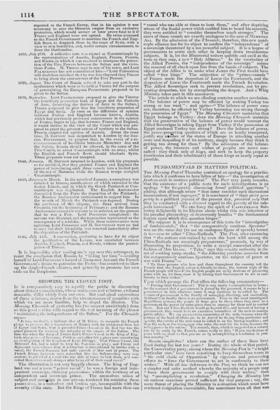SHOWING THE CLOVEN FOOT.
IT is comparatively easy to lnystilY the public in discoursing about distant ant communities, whose sentiments and relations, civil and domestic, differ widely from our own. But analogical expressions of these relations, (buss n front the circumstances of countries with which we are more familiar, help to dispel the illusion. The Morning Chronicle of yesterday has (we suspect unwittingly) done us this good service with regard to the real meaning of the phrase "maintaining the independence of the Sultan." For the Chronicle says- " It was, no doubt, a brilliant idea of M. 'niers, to reconcile the French pledge to pre--erve the it depetnEnce of Turkey u ;ill the 11 d raNs al from her of Egypt and Syria, tl at it powe611 Prince-Vosal uu tin. Red Sea was the grand panacea tar :searing the integrity of the 1. inpire of the Sultan. The time was when the King of France had a Prince- Vassal in the King of Eng- land, who posses: ed f;iiienne, Puictou, and other fair r,gitis now constituting no small portion of the kingdom of Blois Philippe. That Prince-Vassal, like Mehemet Ali, had a mind to keep Lis 5,1Z,!faill in play ; and Cressy and Agincourt were witness that if a kiugdnin is strengthened by battles with a vassal, the French Suzerain had quite enough of that sort of power. The French Kings, however, were somewhat like the Sultan—they were very anxious to get rid of a vusital who was able at tines to beat them, and con- ceived themselves much stronger after being, rid of their royal rascal."
The illustration is not very happily chosen. The King of Eng- land was not a mere " prince vassal": he was a foreign and inde- pendent sovereign, claiming possessions within the territory of an
mdependent and sovereign prince. The anomalous union of subject and soverAlign in one person, rendered his retaining these possessions, in a turbulent and lawless ego, incompatible with the security of the state. But the Kings of France had more than one
" vassal who was able at times to beat them," and after depriving whom of the feudal power which enabled him to beard his suzerain, they were entitled to " consider themselves much stronger." The cases of these vassals are exactly analogous to the case of M1:11EMET ALL By the admission of the Chronicle, therefore, this new quad- ruple alliance has for its object to confirm the "independence" of a sovereign threatened by a too powerful subject. It is a league of governments to assist each other in keeping down troublesome subjects. It is, let the Ministerial writers quibble and cavil at the term as they may, a new " Holy Alliance." In the vocabulary of the Allied Powers, the "independence of the sovereign" means the removal of all cheek upon him from the hands of subjects. The object of the Allies is to make what JAMES the First would have called "free kings." The subjection of the "prince-vassals" of France made the despotism of Louts the Fourteenth, and the- despotism of' Louis the Fourteenth made the French Revolution. The Allied Sovereigns seek to prevent revolutions, not by pre- venting despotism, but by strengthening the despot. And a Whig Ministry takes part in this manoeuvre.
The article to which we are alluding contains another revelation. "The balance of power may be affected by making Turkey too- strong or too weak " : and again—" The balance of power can• not, therefore, be affected by Turkey becoming too strong through the possession of Egypt." The Morning Chronicle maintains that Egypt belongs to Turkey : does the Morning Chronicle maintain that the preservation of the balance of power would warrant the Allied Sovereigns in taking Egypt from Turkey if the possession of Egypt tendered Turkey too strong ? Does the balance of power, the peace-pres_erving qualities of which are so loudly trumpeted, justify any ntiliber of the states of Europe in attacking another state and despoiling it of its territory, simply because they think it getting too strong for them ? By the advocates of the balance of power, the interests and wishes of peoples arc never con- sulted : they think only of Rings, and seek to keep the property (territories and their inhabitants) of those kings as nearly equal as possible.


























 Previous page
Previous page